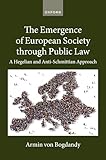The emergence of european society through public law : a hegelian and anti-schmittian approach / Armin von Bogdandy.
Series: Collected courses of the academy of european lawPublisher: New York : Oxford University Press, 2024Description: pages cmContent type:- text
- unmediated
- volume
- 9780198909347
| Item type | Current library | Status | Barcode | |
|---|---|---|---|---|
 Open Access Books - Publishers
Open Access Books - Publishers
|
National Law School | Available | OABP439 |
"Many Europeans struggle to understand where EU-centred Europeanization has led them. The standard response-that their situation is sui generis, one of a kind-no longer holds. Brexit, conflicts over European financial transfers, immigration, or dubious judicial reforms in some Member States demand a more substantial answer. Against that background, the book frames European integration by reconstructing European public law in the light of Article 2 of the Treaty on European Union (TEU). According to Article 2 TEU, all Europeans are today part of one society. European integration may not have produced a European state or people, but it has helped create a European society. This society is interwoven with European public law, as the Treaty characterizes it with 12 constitutional principles. The book interprets this statement as the manifesto, identity, and constitutional core of a democratic society. Thus, Europeans should understand that European integration has ushered in a European democratic society. This approach takes the bull by the horns because democracy represents the key concept in the struggle to understand and develop our society. On that basis, the book goes through many of the great debates of European public law and presents them in a new and forward-looking light"-- Provided by publisher.
There are no comments on this title.
